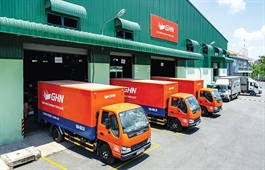HLH, Skiold reach MoU on $1B SEZ to boost food security
HLH, Skiold reach MoU on $1B SEZ to boost food security
Singapore-listed property development and agricultural investment firm Hong Lai Huat Group Ltd (HLH) on Monday reached a non-binding Memorandum of Understanding (MoU) with Denmark-based farm equipment supplier Skiold A/S.
The two parties intend to collaborate on a proposed “Cambodia-Singapore Agriculture Special Economic Zone” with a $1 billion estimated investment value, HLH said in a filing to the Singapore Exchange (SGX) on Monday evening.
The MoU aims to lay the foundation for a mutual platform to enhance trade and economic cooperation and technical exchanges within the field of poultry and cattle farming as well as seed processing for Cambodia, it said.
It listed three primary objectives to be completed within the next six months before the two parties sign a binding agreement.
First, they will initiate the necessary procedures towards setting up livestock and seed production in the special economic zone (SEZ).
Second, they will perform a feasibility study on the project to produce poultry, cattle and seed production in Cambodia as well as Singapore, to supply and enhance the city-state’s food security.
Third, they will create more job opportunities for countries in connection with the partnership and any resulting spin-offs.
HLH general manager and executive director Ong Jia Jing said: “We are very pleased to have entered into this MoU with Skiold A/S on the potential collaboration of the Cambodia-Singapore Agriculture Special Economic Zone.
“Particularly in a world that has been greatly affected by Covid-19, food security is a highly significant matter that all countries are looking into resolving.
“We believe that this collaboration will be meaningful and a success for both of our companies and will allow us to contribute to Cambodia as well as Singapore,” he said.
Skiold regional director Dr Sussie Ketit said that with more than 140 years of developing, projecting and producing advance machinery for agro-industry, the company is one of the most preferred and experienced companies in the field, and has delivered successful projects all over the world.
She said: “Being a company that has broad range of expertise in the livestock industry, we see this collaboration as an excellent connection and hope to see positive-result spin-offs [born] from the initiative not only in Cambodia but also in Singapore.
“We hope that through the initiative . . . [we can] help Singapore reach [its] ‘30 by 30’ vision [by] adopting Danish technologies to raise productivity, apply R&D [research and development], strengthen food resilience and sustainability,” Ketit said, referring to Singapore’s “30 by 30” goal of producing 30 per cent of its nutritional needs domestically by 2030.
HLH has said it grows cassava on a 9,000ha plantation in Kampong Speu province’s northwest Oral district and manufactures starch at its processing plant for food industry clients from Europe and Southeast Asia.
Its food-grade tapioca-starch production capacity is around 36,000 tonnes per annum, or 100,000 tonnes with the inclusion of its associate factories, it said.
Kampong Speu provincial governor Vei Samnang said the cooperation will help develop the province, create more jobs and new markets for provincial farmers’ agricultural products.
“I welcome and support them. I want them to invest in the province to help increase the value of the production chain, and especially find markets for our farmers,” Samnang said.
He neither confirmed nor denied knowledge of the anticipated SEZ project’s proposed location.
















